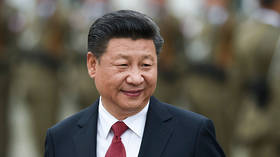
The CPTPP was initially designed to counter Beijing’s influence in the Indo-Pacific region

© Getty Images / Tim Robberts
The UK has formally signed an accession protocol to join major Indo-Pacific trading bloc the Comprehensive and Progressive Agreement for Trans-Pacific Partnership (CPTPP). The treaty was inked on Sunday by UK Business and Trade Secretary Kemi Badenoch in Auckland, New Zealand, following 21 months of talks on British membership.
The agreement is now set to be inspected by the UK Parliament and existing CPTPP members, and could come into force in the second half of next year, according to reports.
Speaking to Sky News following the signing of the treaty, Badenoch described the deal as the biggest trade agreement for the UK since Brexit and proof that the nation is “looking outwards towards the world.”
“We have a seat at the table in the fastest-growing region, countries are queuing up [to join]… I’m really excited that we’ve brought home the biggest trade deal since we left the European Union,” she stated.
Badenoch said the deal would “open up huge opportunities and unparalleled access to a market of over 500 million people.” The 11-member CPTPP includes Canada, Mexico, Japan, Australia, Vietnam, Singapore, and Malaysia, among others, and the bloc’s total GDP following the UK’s accession is estimated at $15.7 trillion.
However, some analysts argue that the agreement is largely “cosmetic” for the UK, which itself estimates that the CPTPP is worth just 0.08% of its GDP.
“Ministers also need to set out how this will help the economy and what support will be given to businesses to access any export opportunities,” the UK shadow secretary of state for international trade, Nick Thomas-Symonds, told Sky News.

The CPTPP grew from the now-defunct Trans-Pacific Partnership (TPP), which was created by the US to counter Beijing’s influence in the Indo-Pacific region. The TPP fell apart after former President Donald Trump scrapped US involvement, but evolved into its current form under the efforts of other members.
Many analysts say the bloc is likely to continue with its policy of countering Beijing, although the organization is viewed as facing a dilemma after China and Taiwan both submitted membership applications in 2021.
Opinions on China’s accession reportedly vary. While Singapore and Malaysia believe it could lead to more reform and openness from Beijing, American allies Japan, Australia, and Canada have expressed reservations. Some experts predict it would be difficult for China to join the bloc as its accession could be vetoed at Washington’s request, despite the US no longer being a member.
For more stories on economy & finance visit RT’s business section




